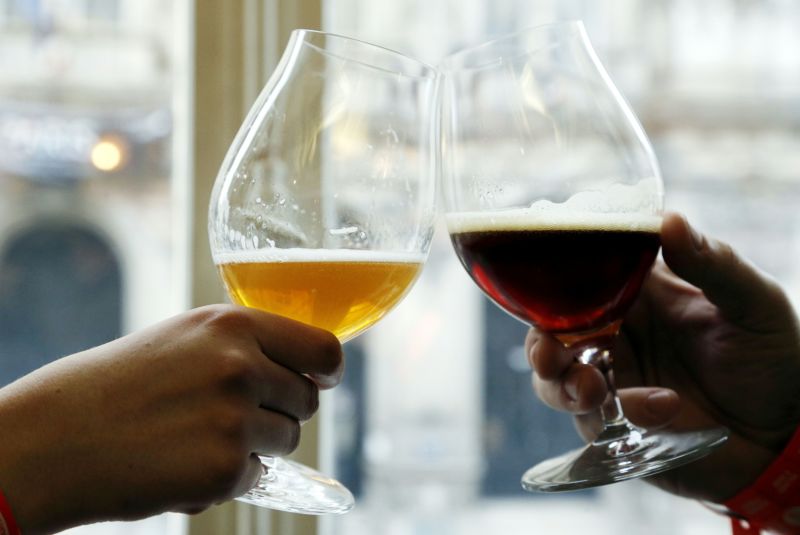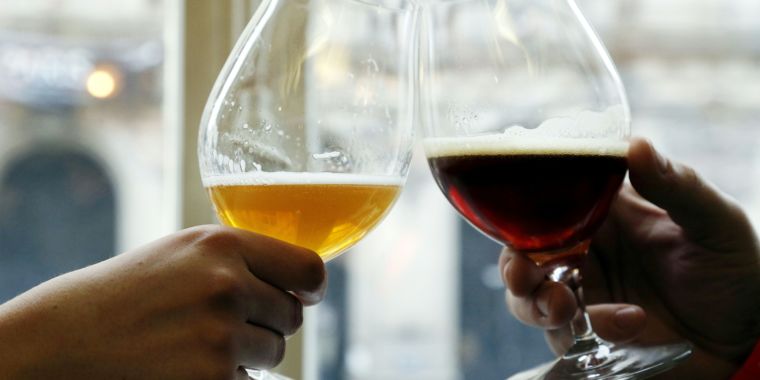
The National Institutes of Health goes by mounting criticism and questions amid a series of experiences outlining what appears to be like to be an all-too-cozy relationship with the alcohol industry.
Central to the concerns are how the federal compare company schmoozed industry executives into donating tens of thousands and thousands of greenbacks for a scrutinize assessing the probably health advantages of every day drinking. Researchers and NIH officials pitched the scrutinize by strongly suggesting that it would pause up endorsing moderate drinking as part of a wholesome each day life, documents and interviews confirmed.
Amid that wooing, varied researchers claimed for the first time Monday that they were scolded by company officials for accumulating knowledge that regarded extreme of the alcohol industry. They furthermore indicate that the company spiked a equally extreme compare proposal, despite that it used to be highly ranked by scientific peers who private in tips proposals for funding recommendations.
In a assertion last month, NIH Director Francis Collins stated that the “NIH might perchance well be having a survey into this matter.” He furthermore informed journalists that “there are concerns that… there might perchance well perchance perchance also merely private been some wicked discussions that went on between other folks working at NIH unbeknown to me and the beverage industry,” per The Washington Submit.
The National Institute on Alcohol Abuse and Alcoholism (NIAAA), which is on the middle of the controversy, did indirectly reply to a save apart a question to for comment from Ars.
Tipsy track file
One amongst the first sips of scandal dates support to last July when The Novel York Instances reported on the scrutinize having a survey at probably advantages of booze, dubbed the Moderate Alcohol and Cardiovascular Health Trial (MACH). The $a hundred million-greenback, 10-year scrutinize is now underway and will one way or the other be part of 7,800 contributors frail 50 or over at sixteen sites worldwide. 1/2 of the contributors will abstain from hooch, whereas the comfort will imbibe one serving a day. Scientists will track contributors for a median of six years, having a survey at risks of heart assaults, strokes, diabetes, and loss of life.
The Instances article illustrious that $sixty seven.7 million for the scrutinize got here—indirectly—from 5 of the sector’s biggest alcoholic beverage companies, including Anheuser-Busch InBev, Diageo, Pernod Ricard, Heineken, and Carlsberg. The companies pledged the money for the scrutinize by a foundation that raises funds for NIH compare. Quite a lot of the researchers on the receiving pause of those funds already had end private ties and/or monetary hyperlinks to the alcohol industry, the Instances article illustrious. That involves NIAAA director George Koob who, for years, prior served on an industry advisory board which furthermore equipped him with tens of thousands of greenbacks in compare funding.
Koob used to be dismissive of any conflicts of hobby on the time, on the opposite hand, telling the Instances: “This scrutinize might perchance well perchance perchance entirely backfire on the alcoholic beverage industry, and to boot they’re going to want to live with it. The money from the Foundation for the NIH has no strings connected.”
But the hyperlinks and the funding didn’t take a seat successfully amongst the compare community, who’re all too aware that industry-backed compare most frequently finally ends up favoring the pursuits of industry. Many furthermore illustrious weaknesses in the scrutinize’s develop, including the brief length that restricted “moderate” drinking to one drink in its save of the extra overall two and lumped girls and males folks’s health assessments collectively. In a subsequent chronicle in Wired from October, researchers again expressed field, with alcohol researcher Jürgen Rehm of Toronto’s Centre for Dependancy and Psychological Health, telling the magazine that « the reach here is decided up, it smells. »
The Wired article furthermore illustrious that Koob and NIAAA director of world alcohol compare Margaret (Peggy) Murray every regarded in a promotional video for Anheuser-Busch InBev, one in every of the MACH funders, as the NIAAA used to be developing for the trial. The video used to be about company-backed compare.
Over a drink
The difficulty regarded even extra ethically dubious after a observe-up document in The Novel York Instances printed March 17 of this year. In step with emails and go back and forth vouchers obtained by a Freedom of Knowledge Act save apart a question to, to boot to interviews, the Instances reported that the NIAAA “waged a involving advertising and marketing campaign” to pursue industry funding in 2013 and 2014. This fervent having scientists schmooze with industry executives at conferences and lunches, permitting executives to preview the trial develop and vet researchers who strongly advised the scrutinize would pause in their desire.
Kenneth Mukamal, of Harvard Scientific College and now lead investigator of the MACH trial, alongside with John Krystal, a Yale University neuroscientist, forcefully pitched the trial as being in a suite to dispel concerns about moderate, every day drinking. And their pitch used to be adopted-up with NIAAA officials who entreated them to financially increase the scrutinize.
“A definitive clinical trial represents a varied opportunity to indicate off that moderate alcohol consumption is first-charge and lowers threat of overall ailments,” one in every of the scientists’ slides read. “That level of evidence is critical if alcohol is to be steered as part of a wholesome diet.”
“We private stable reason to suspect so,” but any other droop read, relating to the earlier compare linking moderate alcohol to reduced risks of cardiovascular disease.
The Instances concluded that its efforts might perchance well perchance perchance also merely private violated NIH insurance policies, which prevent staff from soliciting funds, donations, or varied sources to enhance NIH actions. The NIH is now investigating whether that used to be the case. NIH Director Francis Collins illustrious in his response to essentially the most fresh Instances document that the NIH signed a memorandum in 2016 with the muse, which would restrict contact between NIH officials and industry sponsors. But he expressed field about what went on ahead of that memorandum used to be in predicament.
For his part, Koob raised his disclose at some stage in an interview for essentially the most fresh Instances article, insisting that the industry sponsorship used to be not a field and that the scrutinize used to be location up because it might perchance perchance well perchance perchance be.
Bottoms up
On Monday, Stat reported but any other troubling wrinkle to the chronicle: whereas the NIAAA used to be ironing out its industry-backed scrutinize on alcohol’s probably advantages, it used to be ending off compare which might perchance well well perchance perchance also merely seem antagonistic to the industry.
Alcohol researchers David Jernigan of Johns Hopkins University and Michael Siegel of Boston University informed the tips outlet that they were summoned to a gathering on the NIH, in Bethesda, Maryland, with director Koob in 2015. The assembly used to be regarding their NIH-funded work assessing the hyperlinks between alcohol industry promoting and underage drinking. The pair obtained roughly $600,000 a year between 2011 and 2014 to fund work that resulted in 27 publications in legit, test-reviewed journals. A form of, printed in 2014, came upon a “tough relationship” between designate-specific alcohol TV commercials and consumption of those branded alcohols consumed by kids.
The findings did not take a seat successfully with Koob, who allegedly leapt screaming from his chair at some stage in his assembly with Jernigan and Siegel. After hearing a summary of their compare findings, the pair stated he hotly yelled “I don’t f***ing care!” He furthermore indicated that such compare would not be funded sooner or later.
Koob used to be wonderful to his note, it appears to be like. The pair submitted but any other grant utility later in 2015, proposing to scrutinize whether alcohol brands’ spend of social media influences underage drinking. The proposal scored “in the extra special fluctuate” amongst scientific-grant reviewers, per the evaluation shared by Siegel. The scientists steered the proposal for funding. But a secondary evaluation, led by Koob, denied the undertaking funding with out explanation.
In accordance with emails obtained by Stat by a public info save apart a question to, Koob had rushed to reassure industry about the Siegel and Jernigan’s work—months ahead of their annoying assembly on the NIH. In an e-mail dated July 30, 2014, Koob wrote to Samir Zakhari, senior vp for science on the Distilled Spirits Council of the US, the lobbying neighborhood for alcoholic beverage producers.
Koob, who took over the role of NIAAA director in January 2014, wrote:
Sam: For the file. This would well perchance also merely NOT happen again. It used to be funded over three years in the past under a PA [project announcement] that would not exist anymore. I will NOT be funding this extra or much less work under my tenure. Absolute most realistic wants George.”
Zakhari, who joined the lobbying neighborhood after retiring from two a few years of labor on the NIAA, spoke back two hours later, writing:
Thanks, George.
I am a hundred% effective that you just will exhaust compare money on proper science. You’ve got plenty of other folks in the division of epidemiology who push to fund this extra or much less compare out of shear [sic] lack of information or because they are sympathetic. This extra or much less compare not biggest wastes treasured compare greenbacks however furthermore damages NIAAA’s stature inner the NIH community.Absolute most realistic regards,
Sam
In a assertion to Stat, Koob stated that his e-mail to Zakhari used to be “to bring that I had no blueprint of supporting compare that used to be not of the kindly scientific quality. NIAAA funds a mountainous quantity of compare on underage drinking, which is amongst the Institute’s top compare priorities.”


Commentaires récents